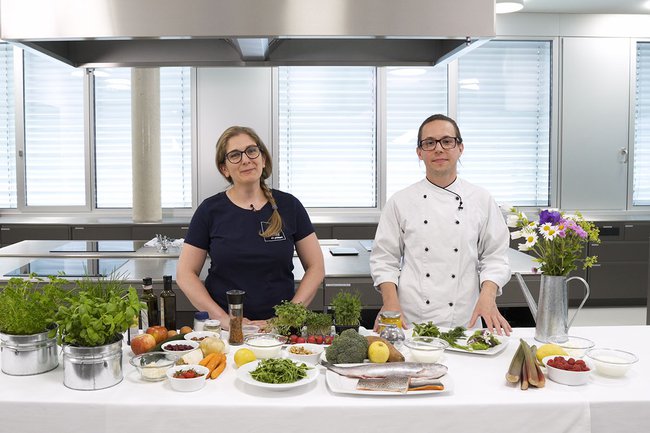Anti-Inflammatory Diet against Arthritis
From the Science Lab to the Plate: Project Develops Recipes for “Arthritis Cuisine”

Researchers and students have developed recipes for an “Arthritis Cuisine” together. The joint research project NUMOQUA of the St. Pölten University of Applied Sciences, the University for Continuing Education Krems, and the University of Vienna examined how nutrition and exercise can impact the wellbeing of knee arthritis patients, and how complaints can be relieved through the right diet.
Fighting Arthritis with Exercise and Nutrition
Knee arthritis as a disease pattern is widespread in the population. Approximately 20 percent of the total population suffer from knee arthritis and the accompanying restrictions. This interdisciplinary research project explores the potential implications of a combination of movement and nutrition therapy on the inflammatory processes in the knee.
In this context, the focus is not on weight reduction or on counting calories but on the targeted selection of certain foods that are intended to help counteract the inflammatory processes. In the project, the study participants underwent a six-week interdisciplinary group programme consisting of physiotherapy and nutrition therapy and were then further supported individually for several months.
Together with students of the St. Pölten UAS’ degree programme Dietetics, the project team developed recipes for an anti-inflammatory diet referred to as “Arthritis Cuisine”.
New Nordic Diet as Basis
The Austrian Arthritis Cuisine is based on the principles of the “New Nordic Diet” from Scandinavia which was developed in the early 2000s on the basis of general nutrition recommendations, environmental protection and sustainability aspects, and regional food traditions.
“The principles of the New Nordic Diet can be easily transferred to Austria because many regional Austrian products match foods that are important in the New Nordic Diet. These primarily include fruit and vegetables such as root vegetables, cabbage varieties, legumes, apples, pears, berries, grains such as wholegrain rye and oats, and rapeseed oil”, explains Sabine Chmelar, Junior Researcher at the Institute of Health Sciences at the St. Pölten UAS, who is currently writing her dissertation on this topic.
Low Environmental Impact through Regional and Seasonal Products
In order to promote the long-term implementation of the Austrian Arthritis Cuisine, regional aspects were taken into account in its development. “Due to the high share of plant products and the promotion of regionally sourced and organic foods, the Austrian Arthritis Cuisine is associated with a lower environmental impact than the average Austrian diet”, adds Chmelar.
The recipes are characterised by the fact that they can be easily adapted to the season by simply exchanging the types of fruit and vegetables they use. In this way, regional and seasonal foods are always given preference.
Recipes of the Arthritis Cuisine
Within the framework of the project, the researchers and students created a comprehensive collection of recipes designed to support the test persons in the diet’s practical implementation in everyday life. Chmelar and UAS graduate Philipp Buttinger made a video for the recipes as well (https://youtu.be/3ESegNywn6I). Buttinger is a graduate of the study programme Dietetics and a professional cook with dietetic training.
Three recipes are publicly available for download:
- Bean burgers on a bed of cucumber/apple with green salad
- Roast salmon trout filet with sweet potato puree and broccoli
- Buttermilk jelly with rhubarb/raspberry sauce
Practice-Oriented Training
In the study programme Dietetics at the St. Pölten UAS, the students acquire a sound knowledge in the areas of disease prevention and nutrition therapy, food quality, counselling and communication, and research and management for a healthy diet and evidence-based nutrition therapy. In the St. Pölten UAS’ Kitchen Lab, they develop and test, e.g., recipes that have a supportive effect on patients with certain disease patterns. Anti-inflammatory nutrition is part of this concept.
The NUMOQUA project receives funding from the Gesellschaft für Forschungsförderung Niederösterreich (Lower Austrian research promotion agency).

Sabine Chmelar , MSc
Junior Researcher Institute of Health Sciences Department of Health Sciences
Mag. Mark Hammer
Section Head PressMarketing and Communications